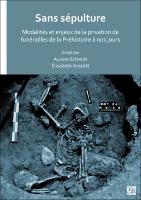Sans sépulture
Modalités et enjeux de la privation de funérailles de la Préhistoire à nos jours
Contributor(s)
Schmitt, Aurore (editor)
Anstett, Elisabeth (editor)
Collection
Knowledge Unlatched (KU)Language
FrenchAbstract
Paradoxically, while the fragmentation, desecration or abandonment of remains is attested in many archaeological or historical contexts, the intentional absence of funerary rites has not yet been the subject of systematic or comparative studies in the social sciences. Therefore, little is known about what leads a society to intentionally deprive an individual of funeral treatment. Are the modalities of funeral deprivation always and everywhere the same? Or do they vary according to socio-historical context, being singularly linked to crisis situations? What are the different issues at stake in the deprivation of funeral treatment? More generally and analytically, on the basis of what concrete elements can we identify and qualify situations of deprivation of funeral rites? To answer this vast set of questions, this volume gathers twelve contributions from archaeologists, anthropologists and historians, the fruit of collective work carried out during study sessions that took place in 2021 and 2022 in Montpellier and Marseille. These sessions initiated a particularly rich and dense interdisciplinary and diachronic reflection on the diversity of motivations that lead to the intentional deprivation of funerals. Taken together, the twelve chapters also invite us to reflect on the intellectual path that allows us to attest the absence of funerary treatment, from archaeological, historical or ethnographic data, and on the intellectual and theoretical tools available to approach the question of the deprivation of funerals.


 Download
Download